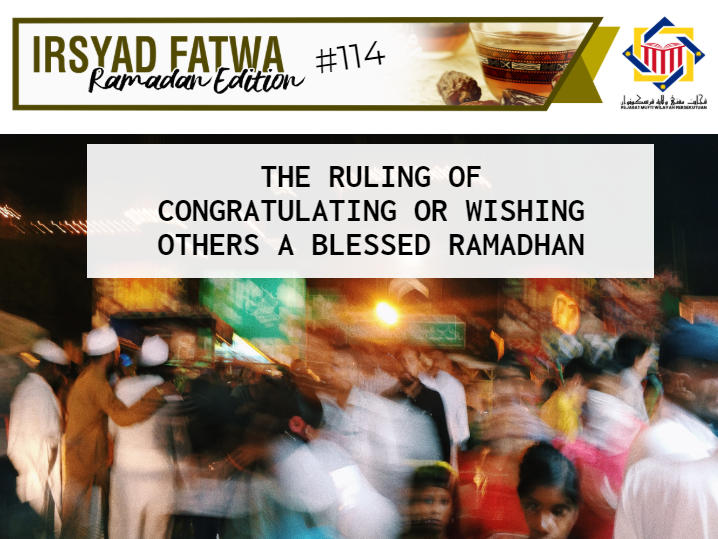Question:
Assalamualaikum ustaz. We often receive congratulatory remarks such as “Ramadhan al-Mubarak”, “Happy fasting” and others at the beginning of the month of Ramadhan. Are there syarak evidences on this matter?
Answer:
Waalaikumussalam wrt, wbt.,
Alhamdulillah, praise and thanks to Allah for the countless blessings He has blessed us all with. Blessings and salutations to the Prophet Muhammad PBUH, his wives, his family, companions and all those that follow his teachings to the day of judgement.
We will start our answer to the above question by defining what is congratulatory remarks. Lexically, a congratulatory remark means: “Offering encouraging words to make others happy in conjunction with special events or celebrations.”
In the issue of offering congratulatory remarks for the arrival of certain months or days, we would like to state that it is included as a custom in a society of which all of them are permissible as long as there is no prohibition against it. This is in accordance with a famous Islamic legal maxim:
أن الأصل في جميع العادات القولية والفعلية الإباحة والجواز
“Indeed, the original ruling of any custom whether it is in the form of words or actions are permissible.”
Thus, congratulatory remarks for the arrival of the month of Ramadhan al-Mubarak such as encouragements to increase our worship in Ramadhan is one of the custom or tradition in our society.
Furthermore, there are also several narrations which show that it was also the practice and custom of the Messenger PBUH and the Companions as well as the salafussoleh.
This is mentioned in a hadith narrated by Abu Hurairah RA, where the Messenger PBUH said:
أَتَاكُمْ رَمَضَانُ شَهْرٌ مُبَارَكٌ فَرَضَ اللَّهُ عَزَّ وَجَلَّ عَلَيْكُمْ صِيَامَهُ تُفْتَحُ فِيهِ أَبْوَابُ السَّمَاءِ وَتُغْلَقُ فِيهِ أَبْوَابُ الْجَحِيمِ وَتُغَلُّ فِيهِ مَرَدَةُ الشَّيَاطِينِ لِلَّهِ فِيهِ لَيْلَةٌ خَيْرٌ مِنْ أَلْفِ شَهْرٍ مَنْ حُرِمَ خَيْرَهَا فَقَدْ حُرِمَ
“There has come to you Ramadan, a blessed month, which Allah, the Mighty and Sublime, has enjoined you to fast. In it, the gates of heavens are opened and the gates of Hell are closed, and every devil is chained up. In it, Allah has a night which is better than a thousand months; whoever is deprived of its goodness is indeed deprived.”
Sunan al-Nasaie (2106)
Imam Ibn Rajab al-Hanbali in his commentary of the above hadith said:
وكان النبي صلى الله عليه وسلم يبشر أصحابه بقدوم رمضان
“The Prophet PBUH convey the great news to his companions on the arrival of the month of Ramadhan.” Refer Latha’if al-Ma’arif, Ibn Rajab (pg. 147).
Whereas, some scholars state that the above hadith originated from the action of Muslims congratulating each other upon the arrival of Ramadhan.
Syeikh Mulla ‘Ali al-Qari said: “This hadith is the origin of the custom of congratulating others at the beginning of blessed months.” See Mirqat al-Mafatih, Mulla Ali al-Qari (4/1365).
Syeikh Abd al-Ghani bin Yasin al-Labadi also said: “As for congratulatory remarks on the arrival of the two Eids, years and months as the custom and tradition of people, I don’t see any syarak evidences according to our ashab. And it is narrated that the Prophet PBUH convey the great news of the arrival of Ramadhan to his companions.” Refer Hasyiah Al-Labadi, Abd al-Ghaniy Al-Labadi (1/99).
Likewise, it is stated by Imam Ibn Hajar al-Haitami who cited the words of al-Syeikh al-Maquliy: “I don’t see any opinion from our ashab regarding the issue of congratulatory remarks for Eid, years and months as it is the custom of most people. However, al-Hafiz al-Munziri cited al-Hafiz al-Maqdisi’s answer on the issue, where he said: Most people have differing opinions on this matter. In my opinion, it is permissible. It is neither a sunnah nor a bidaah.” Refer Tuhfah al-Muhtaj, Ibn Hajar Al-Haitami (3/56).
Conclusion
To close, we would like to state that in the issue of congratulating the arrival of Ramadhan or Syawal with words of encouragement for fasting is permissible. This is so after considering that it is among the matters of custom which does not contradict the syarak, for there are no syarak evidences that prohibit such remarks.
Lastly, we pray that Allah SWT gives us all the correct understanding in practising this religion. Amin.


